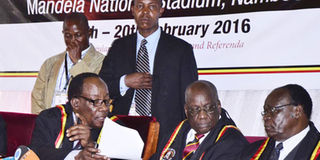ELECTION PETITION: Kiggundu to be cross examined

Badru Kiggundu ( left)
What you need to know:
The notice. Mr Amama Mbabazi, through his lawyers, has written to the Supreme Court Registrar that they will seek leave of court to cross-examine Eng Badru Kiggundu
Kampala.
When the hearing of presidential election petition gets underway today, the petitioner wants Electoral Commission (EC) chairperson Badru Kiggundu to be among the first to take to the witness stand for cross-examination.
Mr Amama Mbabazi, through his lawyers representing him at the Supreme Court, has written to registrar Tom Chemutai, notifying him that they will seek leave of court to cross-examine the head of the electoral body.
“Following the analysis of the availed documents during inspection, we hereby notify you that we shall seek leave under rule 14(2) of the Presidential Election Rules, 2001, to cross-examine Eng Kiggundu on his affidavit sworn in support of the answer to the amended petition...” the March 12 letter reads in part.
If court grants Mr Mbabazi’s request, then Eng Kiggundu is expected in the courts’ witness dock either later today or tomorrow. The petitioner’s side has only two days from today to present their case, according to a programme communicated by the Chief Justice last week.
A source on Mr Mbabazi’s legal team under the cloak of anonymity said their plan is to have the EC chairperson speak from his mind without reading from any prepared script as he responds to their questions.
Mr Eric Sabiiti, the head of the legal department at the EC, confirmed the receipt of the letter, saying they will leave it to court to guide on the way forward.
“We got the notice informing us that they would want chairman to appear before court for cross-examination. It was served to Enos Tumusiime (the lead lawyer for the Commission). We will have to wait for court’s directive on whether, and if it is actually necessary, for the chairman [Kiggundu] to come for cross-examination,” Mr Sabiitis said.
“We will avail him if court directs,” he added.
The demands
Top of the list of issues that Mr Mbabazi’s legal team wants Eng Kiggundu to clarify on is how he got the results from which he announced President Museveni as the winner of the February 18 polls.
The legal team alleges the EC did not have a national tally centre to compute the final results, a scenario they claim has puzzled them.
The other issue that Mr Mbabazi lawyers want to quiz Eng Kiggundu on is about the delay in delivery of voting materials, especially to Kampala and Wakiso districts, which are in close proximity to the EC head office. In some areas in Kampala and Wakiso, voting started at 2:30pm and 4pm yet the official opening time was 7am.
In his sworn affidavit replying Mr Mbabazi, however, Eng Kiggundu said the delay was due to a miscalculation as they concentrated on delivering polling materials to far areas and underlooked those close ones, adding that the delay was not ‘deliberate’.
“The exercise was commenced with the farthest districts from Kampala and because of the miscalculation stated above, there was delay in the delivering polling materials to some polling stations of the closest districts of Kampala and Wakiso. None of the delays were deliberate and mitigating measures were put in place by extending time for voting in affected polling stations,” Eng Kiggundu’s affidavit reads it part.
“The reason for the delay was due to a miscalculation by the 2nd respondent (EC) of the time required to implement improvements to the design of the declaration of results forms,” the affidavit adds.
Another issue that Eng Kiggundu is expected to answer is why he declared the final results on February 20 and yet results from 1,787 polling stations were not yet in.
In his affidavit, in response to the amended petition, the EC chairman says even if all the 1,051,720 registered voters in the 1,787 polling stations, whose results had not been received at the time of announcing the results— assuming no valid votes and 100 per cent turn up in those polling stations and were all added on the runner up’s votes— President Museveni would still have won with 54.55 per cent of the total votes cast.
Another demand
The issue of the Biometric Voter Verification System (BVVS) also is part of the issues to be put to the EC boss. According to Mr Mbabazi’s legal team, they want to put to an end the question of whether the number of people verified by the BVVA equals the number of those that voted.




